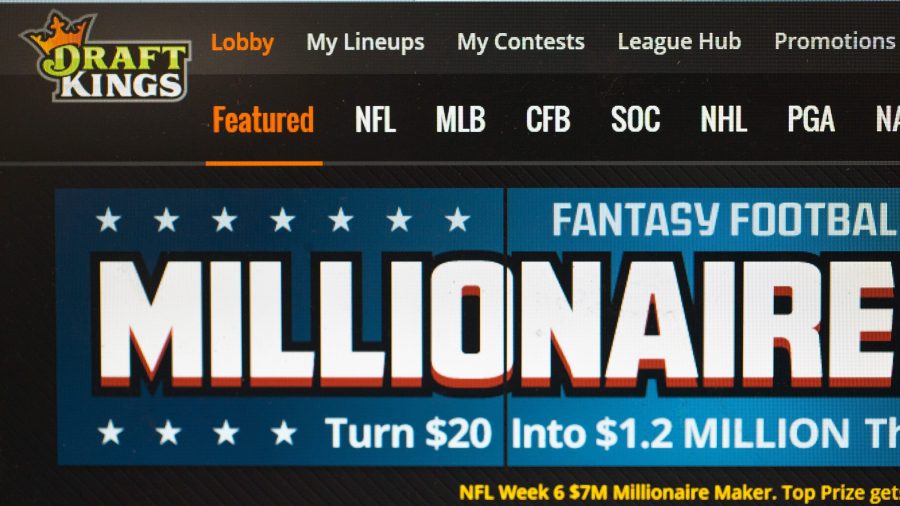Online sports betting grows as more states make it legal

It’s March Madness. And while millions of fans will enjoy watching the NCAA Tournament for college basketball, a decent chunk of them will also be betting on the games.
Dozens of states have legalized online sports betting in recent years, with apps like FanDuel and DraftKings fighting for the eyes and dollars of new gamblers.
To do that, companies are spending a lot on new customers, said John Holden, an assistant professor in the Spears School of Business at Oklahoma State University.
The following is an edited transcript of his conversation with Marketplace host Kimberly Adams.
John Holden: Companies are putting out a lot of promotions trying to induce new customers through free bets or matching offers. At the moment, these companies are spending between $300 and $400 per customer in customer acquisition costs.
Kimberly Adams: What has been behind this shift in recent years for all these states to legalize sports betting, particularly online?
Holden: I think the big push is the constant proverbial story of states are looking for new ways to raise money that doesn’t involve raising taxes. And sports betting is sort of that shiny unicorn right now. I think states have largely misunderstood the economics behind sports betting. One thing that often gets overlooked is historically about a 5% margin that sports books operate on, and then the taxes are coming out of that number. So we’ll see massive amounts of money bet on March Madness, but really, when we look at the gross gaming revenue that sports book operators are making out of that, it’s a much, much smaller number than the billions that we’ll see wagered.

Adams: How do these online sports gambling companies authenticate that users are betting legally, whether it be that they’re in the right state or that they’re the appropriate age?
Holden: We’re starting to see a trend towards companies allowing verification online. Typically, it involves taking a photo of your driver’s license, uploading it, and these systems verify it against hundreds, thousands of online databases and ensure that you are who you say you are. With this being regulated at the state level instead of the federal level, states need to ensure that people are within those state boundaries betting, as opposed to outside those boundaries. So what they do is they employ a company or companies that monitor where you are based on your cellphone, and they determine that you’re within a permissible area in order to bet.
Adams: What has this expansion of online gambling meant for people with problem gambling?
Holden: One of the things that is, I think, concerning to a lot of people who watch the problem gambling space and the gambling space more broadly is that at one time, these people were going to a physical location where there’s a dealer at the table, there’s someone behind the sportsbook, who can say, “Hey, take a minute, timeout.” Now, people are doing it on their phone, they’re doing it from their living room. No one is physically watching them do this. So I think at some point, there will need to be more done than simply including problem gambling phone numbers, There will need to be more interactive action from online sportsbook operators to help people who are displaying problem tendencies.
Adams: Does the fact that these are mobile phone apps, and it’s a bit more gamified, affect the risk for problem gambling?
Holden: Yes, I think it absolutely does. There is a real risk that, what we saw with Robinhood over the summer, where there were concerns from Congress that they were effectively gamifying investing. And I think that similar concerns have been raised with sports betting, and these are not unreasonable concerns. I think that this is stuff that regulators could take steps to impose restrictions on — allowing apps to appear a certain way. Certainly, imposing limits on the number of wagers per hour, things like that to just slow things down. And I think these are kind of reasonable steps that we will see moving forward.
Related Links: More insight from Kimberly Adams
If you or someone you know might be displaying problem gambling tendencies, we’ve included some resources from the National Council on Problem Gambling.
The council also helps run the National Problem Gambling Helpline Network, at 1-800-522-4700.
There are also responsible gaming pages and tools associated with some of these apps. For example, FanDuel allows users to set limits on deposits and the number of contests you can enter.
Finally, Bloomberg has a piece on FoxBets, a sports betting app run by the parent company of Fox News, which is only available in four states and is struggling to compete.
Like John Holden said, the industry is booming. But not all platforms are winners.
The future of this podcast starts with you.
Every day, the “Marketplace Tech” team demystifies the digital economy with stories that explore more than just Big Tech. We’re committed to covering topics that matter to you and the world around us, diving deep into how technology intersects with climate change, inequity, and disinformation.
As part of a nonprofit newsroom, we’re counting on listeners like you to keep this public service paywall-free and available to all.
Support “Marketplace Tech” in any amount today and become a partner in our mission.












